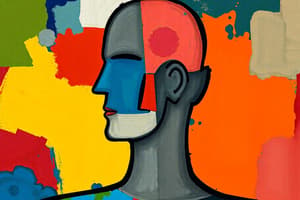Podcast
Questions and Answers
What does the term 'transcendence' refer to?
What does the term 'transcendence' refer to?
- The ability to surpass our limits. (correct)
- The communication without listening.
- The ability to observe others.
- The interaction between the Self and the Other.
What characterizes 'authentic dialogue'?
What characterizes 'authentic dialogue'?
- Talking past each other without engagement.
- Ignoring the perspectives of others.
- A form of communication that acknowledges a greater whole. (correct)
- A one-way communication style.
Which of the following best describes 'biocentrism'?
Which of the following best describes 'biocentrism'?
- Only plants should be considered in ethical discussions.
- Only humans have moral consideration.
- Humans, animals, and plants should all be morally considerable. (correct)
- It is a philosophy that excludes environmental concerns.
What does the term 'self-awareness' mean?
What does the term 'self-awareness' mean?
What distinguishes 'I-Thou' from 'I-it' interactions?
What distinguishes 'I-Thou' from 'I-it' interactions?
What is 'circumstantial freedom'?
What is 'circumstantial freedom'?
Which action best demonstrates 'voluntariness'?
Which action best demonstrates 'voluntariness'?
What is the focus of 'economic efficiency'?
What is the focus of 'economic efficiency'?
What does Nietzsche assert about happiness?
What does Nietzsche assert about happiness?
Which of the following best describes 'speechifying' in the context of obstacles to dialogue?
Which of the following best describes 'speechifying' in the context of obstacles to dialogue?
What is an example of a 'noble good'?
What is an example of a 'noble good'?
How is suffering defined in the context provided?
How is suffering defined in the context provided?
What characterizes post-industrial societies?
What characterizes post-industrial societies?
What characterizes an I-THOU relationship?
What characterizes an I-THOU relationship?
Which level of self-other interaction involves simple awareness of the existence of the Other?
Which level of self-other interaction involves simple awareness of the existence of the Other?
What type of pain is derived from a physical cause?
What type of pain is derived from a physical cause?
According to Aristotle, what is considered the highest desire and ambition of all human beings?
According to Aristotle, what is considered the highest desire and ambition of all human beings?
What best describes the term 'intersubjectivity'?
What best describes the term 'intersubjectivity'?
Which type of society is characterized by the use of plows and oxen for agriculture?
Which type of society is characterized by the use of plows and oxen for agriculture?
Which of the following statements accurately describes 'empathy'?
Which of the following statements accurately describes 'empathy'?
What does Epicurus believe contributes to happiness?
What does Epicurus believe contributes to happiness?
What is a characteristic of the 'I-IT relationship'?
What is a characteristic of the 'I-IT relationship'?
In the context of societies, which of these has a strict hierarchical system based on land ownership?
In the context of societies, which of these has a strict hierarchical system based on land ownership?
What distinguishes 'noble good' from 'pleasurable good'?
What distinguishes 'noble good' from 'pleasurable good'?
What is a common characteristic of people who Nietzsche describes as having mediocre desires?
What is a common characteristic of people who Nietzsche describes as having mediocre desires?
Which of the following best defines 'availability' in human relations?
Which of the following best defines 'availability' in human relations?
What is the result of focusing exclusively on the first level of happiness from material objects?
What is the result of focusing exclusively on the first level of happiness from material objects?
Which of the following terms refers to a social process of understanding others as embedded within the self?
Which of the following terms refers to a social process of understanding others as embedded within the self?
How is 'mental suffering' characterized?
How is 'mental suffering' characterized?
Flashcards
Intersubjectivity
Intersubjectivity
The interaction between the self and others, the condition of being a person among other people.
Authentic Dialogue
Authentic Dialogue
A type of communication where people acknowledge being part of a larger whole.
Self-awareness
Self-awareness
Understanding one's thoughts, emotions, identity, and actions.
Imposition
Imposition
Signup and view all the flashcards
Metaphysical Freedom
Metaphysical Freedom
Signup and view all the flashcards
Person
Person
Signup and view all the flashcards
Social Influence
Social Influence
Signup and view all the flashcards
Prudence
Prudence
Signup and view all the flashcards
Empathy
Empathy
Signup and view all the flashcards
Dialogue
Dialogue
Signup and view all the flashcards
Communirazation
Communirazation
Signup and view all the flashcards
Availability
Availability
Signup and view all the flashcards
I-IT Relationship
I-IT Relationship
Signup and view all the flashcards
Happiness (Level 1)
Happiness (Level 1)
Signup and view all the flashcards
Noble Good
Noble Good
Signup and view all the flashcards
I-Thou Relationship
I-Thou Relationship
Signup and view all the flashcards
First Level of Self-Other Interaction
First Level of Self-Other Interaction
Signup and view all the flashcards
Deeper Level of Self-Other Interaction
Deeper Level of Self-Other Interaction
Signup and view all the flashcards
Physical Pain
Physical Pain
Signup and view all the flashcards
Emotional Suffering
Emotional Suffering
Signup and view all the flashcards
Aristotle's View of Happiness
Aristotle's View of Happiness
Signup and view all the flashcards
Epicurus' View of Happiness
Epicurus' View of Happiness
Signup and view all the flashcards
Nietzsche's View on Happiness
Nietzsche's View on Happiness
Signup and view all the flashcards
What is the defining characteristic of a post-industrial society?
What is the defining characteristic of a post-industrial society?
Signup and view all the flashcards
What is a 'pleasurable good'?
What is a 'pleasurable good'?
Signup and view all the flashcards
What kind of suffering affects our thoughts and feelings?
What kind of suffering affects our thoughts and feelings?
Signup and view all the flashcards
What's an example of a 'noble good'?
What's an example of a 'noble good'?
Signup and view all the flashcards
What is speechifying?
What is speechifying?
Signup and view all the flashcards
Study Notes
Introduction to the Philosophy of the Human Person
- Transcendence: The ability to surpass limits. A subject is an observer, while an object is something observed.
- Intersubjectivity: The interaction between "Self" and "Other." This is the condition of a person among other people who are also subjects.
- Economic Efficiency: Prudence in using resources to minimize waste.
- Availability: Willingness of a person to be present and available to another.
- Speechifying: Talking at someone without listening to them.
- Authentic Dialogue: Interpersonal communication where individuals acknowledge being part of a greater whole.
- Biocentrism: The view that all living things (humans, animals, and plants) deserve moral consideration.
- Person: A human being granted rights, responsibilities, protection, and dignity.
- Social: The life of a group bound by common experiences and reactions.
- Social Influence: When one's emotions, opinions or behavior are affected by others.
- Prudence: Self-governance and discipline using reason. Good judgment in decision-making.
- Self-Awareness: Understanding one's thoughts, emotions, identity, and actions.
- Imposition: Telling another how they should act, behave, and respond.
- I-it: Experiences and sensations where objects are involved.
Human Person and Society
- I-Thou: A concrete encounter without objectification. The first level is awareness of the other.
- Voluntariness: Acting on one's own free will without external influence.
- Physical Freedom: Absence of physical constraints.
- Circumstantial Freedom: The ability to act without external obstacles.
- Metaphysical Freedom: The power to choose among genuine alternatives.
- Animal Domestication: A primary subsistence means for pastoralists.
- Hunting and Gathering: Earliest and most basic economic subsistence method.
- Virtual Society: Product of post-industrial society.
- Empathy: Understanding and sharing another's feelings.
- Industrial Society: Society based on specialized machinery, production, and goods/services.
- Feudal Society: Society with a strict hierarchical system based on land ownership.
- Purpose: Guiding life decisions, shaping behavior, and offering direction.
- Life: The process of existence, acting, reacting, evaluating, and evolving through growth.
- Death: Cessation of heartbeat and breathing; separation of the soul and body.
- Reincarnation: The belief in rebirth after death.
- Loneliness: Feeling of emptiness or hollowness within oneself.
- Happiness: A state of being, not just an emotion.
- Suffering: Discomfort, hunger, stress, and pain. A state of feeling discomfort, pain, depression, anxiety, fear, loneliness, and grief.
- Mental Suffering: Specific types of suffering like depression, anxiety, fear, loneliness, and grief.
Human Relationships
- Noble Good: Actions pursued for their own sake (e.g., love, friendship).
- Pleasurable Good: Qualities which provide pleasure (e.g., money).
- Happiness (First Level): Sensual gratification based on external things.
- Happiness (Deeper Level): A deeper, more impactful state of happiness.
- Intersubjectivity: Shared awareness and understanding between individuals.
- Dialogue: Deep and genuine relationship.
- Empathy: The ability to understand and share feelings.
- Communication: Individuals are part of a greater whole.
- Availability: Willingness to be present to and with another.
- I-IT Relationship: Seeing the other as an object to fulfill needs.
- I-Thou Relationship: Acknowledging the wholeness of the other; relational rather than transactional partnership.
- Self-Other Interaction (First Level): The awareness of the other's existence.
- Self-Other Interaction (Deeper Level): Awareness of oneself as seen by others.
- Physical Pain: Suffering from a physical source.
- Mental Pain: Discomfort, dysfunction, and distress of the mind.
- Emotional Pain: Suffering caused by actions of others; grief, regret, loss.
Philosophical Concepts and Society
- Psychological Suffering: Emotional distress due to stressors and demands.
- Aristotle's Happiness: The highest aim of human beings achieved through virtue.
- Epicurus and Happiness: Belief in happiness stemming from earthly dimensions.
- Nietzsche and Happiness: Happiness as a constant state of well-being, not related to superficial feelings.
- Hunting and Gathering societies: Small, egalitarian societies; low inequality.
- Horticultural societies: Societies based on simple tools to grow crops.
- Pastoral societies: Raise livestock primarily.
- Agricultural societies: Societies with advancements in farming techniques, using tools & animals.
- Feudal societies: Hierarchies based on land ownership.
- Obstacles to Dialogue: Perceived challenges to effective communication.
Death and Impending Death
- Death (Medical Definition): End of life; cessation of brain function (flat EEG).
- Suffering: Discomfort, pain, physical or emotional.
- Seeming: Deliberately portraying a desired image.
- Imposition: Directly telling someone how to act.
- Speechifying: Talking at someone without listening.
- Industrial societies: Feature factories, higher wealth, and individualism.
- Post-industrial societies: Focus on technology, higher education and service jobs.
- Social influence: Effects on one's opinions, emotions, and behaviors due to other people.
Studying That Suits You
Use AI to generate personalized quizzes and flashcards to suit your learning preferences.




